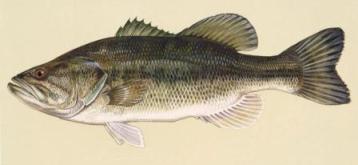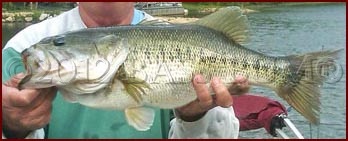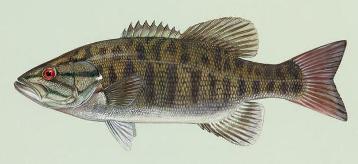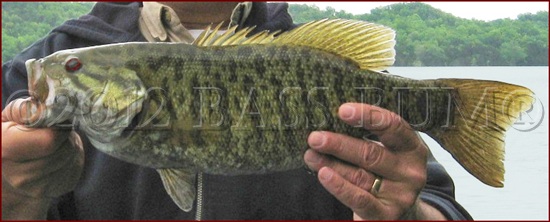Bass Fish
The More You Know About Them
The Better Your Chances of Catching Them
Bass fish, referring here specifically to the largemouth and smallmouth bass, are a cagey and perceptive prey. They possess the same five senses as man, sight, hearing, smell, touch and taste plus a sixth, the lateral line,
a series of sensitive nerve endings that stretch from just behind the
gill to the tail.
These six senses are finely tuned to insure the bass'
survival. Understanding fish facts about how the bass utilizes its
sensory biology can greatly improve your angling success.
In bass fishing there is no such thing as certainty as much lies beyond
our control. This may be why so many of us are drawn to it, as it
closely resembles a game of chance. However, one can improve their
catch rate by understanding that a bass "is what it is".
Largemouth Bass
It is a biological creature that must function within a defined
physical structure which it can not change. It must do what nature
designed it to do according to its biological and chemical makeup and
its instinctual reaction to the environment in which it lives.
Consequently, it will never behave randomly. So there is established a
probability of behavior in given situations. To become a better angler
we will do well to learn and understand this "probability of behavior".
Smallmouth Bass
Our understanding of the sensory terms that govern the behavior of
bass can well determine how skilled a bass fisherman we become. If we
are aware of the what, when, where and why of bass habits through an
understanding of the sensory terms that govern the behavior of bass, we
can more effectively direct our fishing efforts and time.
We'll know what it can sense in its habitat, how it uses its senses of
sight, hearing and smell, combined with its lateral line, to feed, avoid
danger, reproduce and even react to fishing lures. We will be able to
locate bass at given times of the year and under different weather
conditions. If you can't find them, you can't catch them!
Catching Bass, Sometimes Just Dumb Luck, Most Times Not!
A bass' anatomy, combined with its six senses makes it one of the top
predators in our lakes and rivers and a very difficult prey for man to
catch. When you hunt it know that it can see you, hear you and even
feel your presence through its lateral
line. It's even capable of smelling and tasting you!
So, let's start our journey to becoming a better bass fish angler by learning fish facts about the tools our prey use to evade our catching them.
Bass Sense of Eyesight
Eyesight, the primary sense of largemouth and smallmouth bass. They use
it to identify danger and locate and catch their prey. Your lures and
your presentations better be good enough to fool them.
Bass Lateral Line
Lateral lines alert bass to the presence of prey. Even in muddy or dark
water a bass can attack prey using only its lateral line. Vibrating
lures can fool them, maybe.
Bass Hearing
To catch a bass it must see your lure but Largemouth and smallmouth bass
may well hear it before they see it! That's where acoustic lures come
in.
Bass Sense of Smell
A bass can smell a thousand times better than a dog, which smells a
thousand times better than humans. How do they use this to feed and
also avoid our lures?
Largemouth Habitat Learn what constitutes good largemouth bass habitat and you'll know where old "bucketmouth" usually hangs out.
Return to Bass Fishing and Catching
Enjoy this page? Please pay it forward. Here's how...
Would you prefer to share this page with others by linking to it?
- Click on the HTML link code below.
- Copy and paste it, adding a note of your own, into your blog, a Web page, forums, a blog comment,
your Facebook account, or anywhere that someone would find this page valuable.






